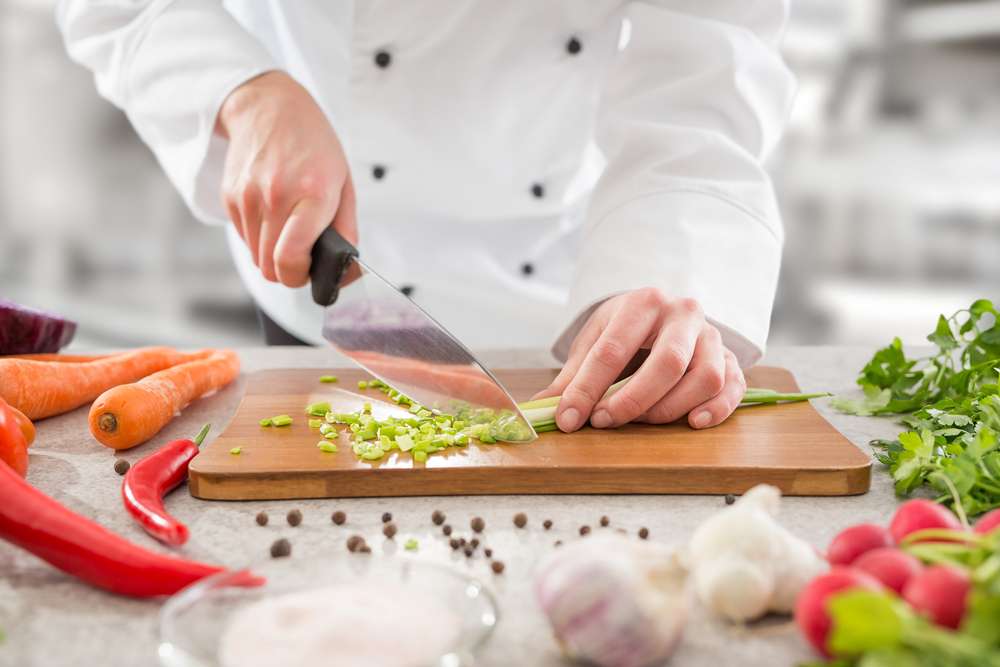When Must A Knife Be Cleaned And Sanitized?
In busy professional kitchens, the cleanliness of tools, especially knives, is non-negotiable. Knives play a central role in food preparation, and maintaining their hygiene through proper cleaning and sanitization is not just a best practice—it’s an essential step in ensuring food safety and preventing the spread of foodborne illnesses so you can make sure you keep your commercial kitchen clean and meeting industry standards.
Understanding the Importance of Knife Cleaning and Sanitization
The Important Role of Knife Cleaning in Food Safety
Clean knives are the unsung heroes of a well-run kitchen. Beyond the obvious aesthetic appeal, the cleanliness of knives plays a vital role in preventing cross-contamination and maintaining the integrity of the dishes they help create.
How Contaminated Knives Affect The Spread Of Bacteria And Foodborne Illnesses
Contaminated knives can be silent culprits in the spread of bacteria and foodborne illnesses. The residues left on a knife from cutting raw meat, vegetables, or other ingredients can become breeding grounds for harmful microorganisms, posing a serious risk to the health of consumers.
When to Clean and Sanitize Your Knives
Cleaning And Sanitizing Knives After Each Use
The golden rule of knife hygiene is to clean and sanitize them after each use. Whether you’re slicing, dicing, or chopping, this practice ensures that any residue is promptly removed, preventing the risk of cross-contamination.
Specific Situations Requiring Immediate Cleaning
Certain situations demand immediate attention:
- After Cutting Raw Meat: Raw meat carries a higher risk of bacterial contamination. Cleaning the knife blade immediately after cutting raw meat is crucial to prevent the transfer of harmful bacteria to other ingredients.
- Switching Between Ingredients: When transitioning from one ingredient to another, especially from raw to cooked, cleaning the knife prevents the mingling of flavors and ensures the safety of the food.
Proper Techniques for Cleaning and Sanitizing Knives
Steps For Effectively Cleaning Knives After Each Use
- Rinse Immediately: Rinse the knife under warm running water to remove visible debris.
- Use a Mild Detergent: Apply a small amount of mild dish soap to a soft sponge or brush.
- Gently Scrub the Blade: Clean the blade with the sponge or brush, paying attention to any crevices or serrations.
- Rinse Again: Thoroughly rinse the knife to remove soap residue.
- Dry Promptly: Dry the knife immediately with a clean, dry cloth to prevent water spots and corrosion.
Recommended Cleaning Products And Tools For Knives
- Mild Dish Soap: Ideal for removing grease and debris without being too harsh on the knife.
- Soft Sponge or Brush: A non-abrasive tool that effectively cleans the blade without causing damage.
- Clean, Dry Cloth: Essential for drying the knife promptly after washing.
Best Practices for Cleaning and Sanitizing Knives
Comprehensive Guide to Proper Cleaning of Knives
- Handle Care: Ensure the handle is also cleaned, as it can harbor bacteria.
- Avoid Harsh Cleaners: Acidic or abrasive cleaners can damage the blade and compromise its integrity.
- Avoid Dishwashers: Handwashing is recommended, as dishwashers can lead to blade damage and exposure to harsh detergents.
Tips For Removing Tough Stains, Odors, And Residue From Knives
- Lemon Juice: Effective for removing stains and odors. Apply and let it sit for a few minutes before rinsing.
- Baking Soda Paste: Create a paste with baking soda and water to tackle stubborn stains. Apply, scrub, and rinse.
Benefits of Proper Knife Cleaning and Sanitization
Enhancing Food Safety
- Preventing Cross-Contamination: Proper care and cleaning prevents the transfer of bacteria between ingredients.
- Protecting Consumers: Ensures the safety of consumers by minimizing the risk of foodborne illnesses.
Extending the Lifespan of Knives
- Preventing Corrosion: Prompt drying and proper cleaning prevent corrosion and rust.
- Maintaining Performance: Regular cleaning contributes to the optimal performance of the blade.
The Importance of Sanitization: Ensuring Food Safety
Preventing Foodborne Illnesses
- Eliminating Harmful Bacteria: Sanitization is the final step in ensuring that harmful bacteria are eliminated from the knife.
- Safe Food Preparation: A sanitized knife provides a clean slate for safe and hygienic food preparation.
Tips for Effective Knife Sanitization
- Use a Sanitizing Solution: Immerse the knife in a sanitizing solution or wipe it with a sanitizing cloth.
- Air-Dry: Allow the knife to air-dry after sanitization to ensure complete effectiveness.
Knife Storage: Maintaining Cleanliness and Safety
Proper Storage Techniques
- Magnetic Strips or Blocks: Store knives on magnetic strips or in designated blocks to prevent contact with other utensils.
- Blade Guards: Use blade guards to protect the blade and prevent accidents during storage.
Choosing the Right Knife Storage Solutions
- Consider Material: Choose storage solutions based on the material of the blade to prevent corrosion.
- Accessibility: Ensure easy access while minimizing the risk of accidents.
Tips for Regular Knife Maintenance
Sharpening and Honing Techniques
- Regular Sharpening: Sharpen knives regularly to maintain their sharpness and cutting precision.
- Honing: Use a honing rod to realign the blade and keep it in top condition.
Inspecting for Damage
- Check for Nicks and Chips: Regularly inspect knives for nicks, chips, or any signs of damage.
- Address Issues Promptly: Address any issues promptly to prevent further damage and maintain knife performance.
Beyond Knife Cleaning: Commercial Kitchen Cleaning
Cleaning and sanitizing knives is not just a routine but a commitment to food safety, hygiene, and the longevity of essential kitchen tools. By understanding the importance of this practice, adhering to proper techniques, and embracing best practices, culinary professionals ensure that each slice, chop, and cut contributes to a safe and delicious dining experience.
When your commercial kitchen needs a deeper clean, be sure to contact Safe Kitchens for our professional restaurant kitchen cleaning service.

